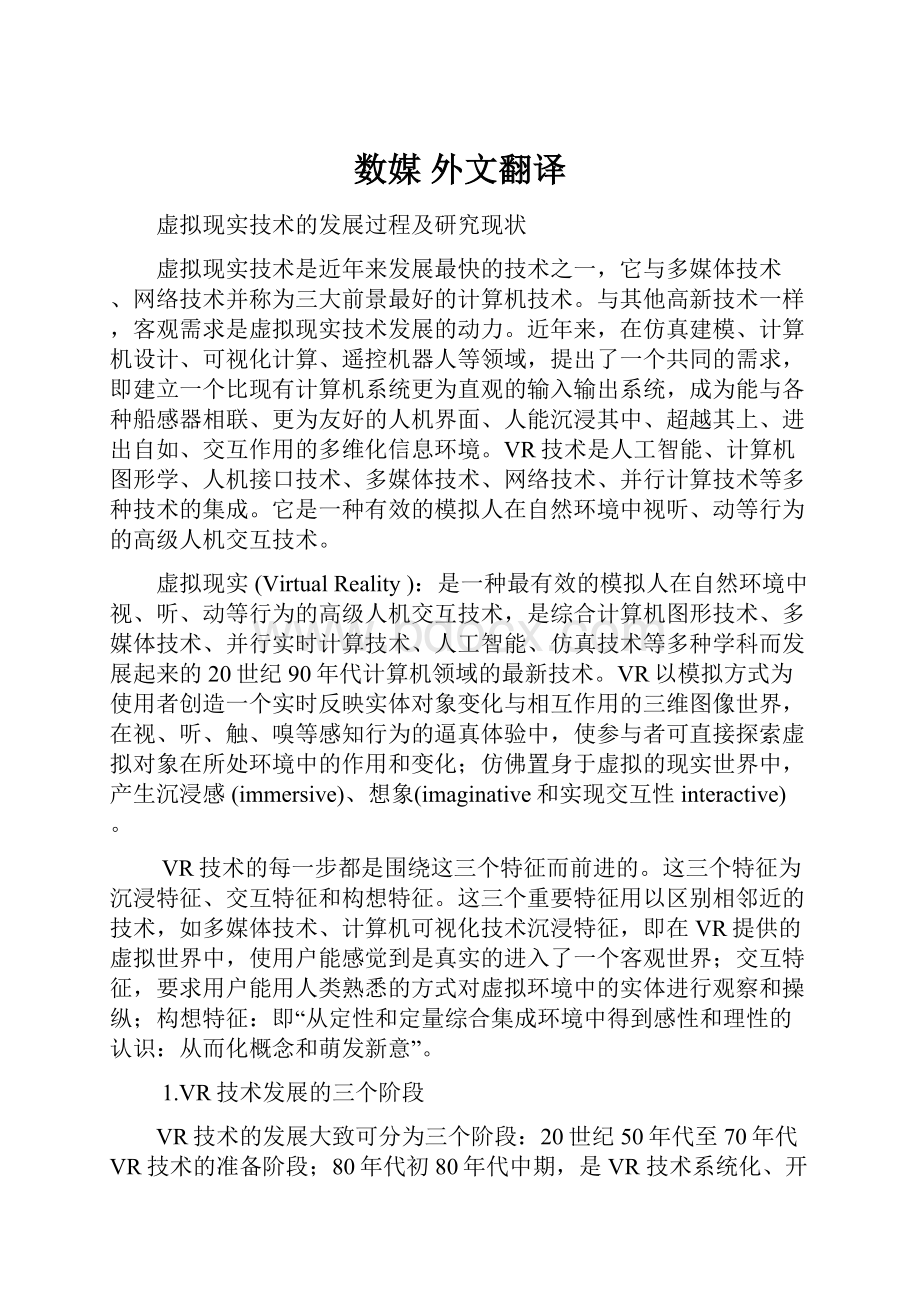数媒 外文翻译文档格式.docx
《数媒 外文翻译文档格式.docx》由会员分享,可在线阅读,更多相关《数媒 外文翻译文档格式.docx(10页珍藏版)》请在冰豆网上搜索。

仿佛置身于虚拟的现实世界中,产生沉浸感(immersive)、想象(imaginative和实现交互性interactive)。
VR技术的每一步都是围绕这三个特征而前进的。
这三个特征为沉浸特征、交互特征和构想特征。
这三个重要特征用以区别相邻近的技术,如多媒体技术、计算机可视化技术沉浸特征,即在VR提供的虚拟世界中,使用户能感觉到是真实的进入了一个客观世界;
交互特征,要求用户能用人类熟悉的方式对虚拟环境中的实体进行观察和操纵;
构想特征:
即“从定性和定量综合集成环境中得到感性和理性的认识:
从而化概念和萌发新意”。
1.VR技术发展的三个阶段
VR技术的发展大致可分为三个阶段:
20世纪50年代至70年代VR技术的准备阶段;
80年代初80年代中期,是VR技术系统化、开始走出实验室进入实际应用的阶段;
80年代末至90年代初,是VR技术迅猛发展的阶段。
第一阶段:
50~70年代,为虚拟现实的探索阶段1965年由美国MortonHeileg开发了一个称Sensorama的摩托车仿真器,不仅具有三维视频及立体声效果,还能产生风吹的感觉和街道气1968年,美国计算机科学家I1E1Sutherland在哈佛大学组织开发了第一个计算机图形驱动的头盔显示器HMD及头部位置跟踪系统,成为VR技术发展史上的一个重要里程碑,为虚拟现实的发展奠定了基础。
第二阶段:
80年代初至80年代中期,开始形成VR技术的基本概念,开始由实验进入实用阶段,其重要标志是:
1985年在MichaelMcGreevy领导下完成VIEW虚拟现实系统,装备了数据手套和头部跟踪器,提供了手势、语言等交互手段,使VIEW成为名副其实的虚拟现实系统,成为后来开发虚拟现实的体系结构其他如VPL公司开发了用于生成虚拟现实RB2软件和DataGlove数据手套,为虚拟现实提供了开发工具。
第三阶段:
80年代末至90年代初,为虚拟现实全面发展阶段虚拟现实技术已经从实验室的试验阶段走向了市场的实用阶段:
对虚拟现实技术的研究也从基本理论和系统构成的研究转向应用过程中所遇到的具体问题的探讨。
在虚拟现实系统中只有各种交互设备还不够,还必须提供基本的软件支撑环境,用户能方便地构造虚拟环境并与虚拟环境进行高级交互。
为了使VR技术得到广泛应用,很有必要分析虚拟现实系统软件支撑环境体系结构,例如Dialogue系统,提出了一种通过基于事件驱动的中驱用户接口管理系统(UMIS),能进行多进程通讯的软件体系结构,解决了虚拟现实的动态灵活性问题,推进了软件支撑环境的发展。
为了满足虚拟现实对计算复杂性的几是无限的要求,虚拟现实系统必须提供足够强的灵活性及可扩充性。
要做到这一点,可以从软件与硬件两方面来考虑,在硬件体系结构方面,DIVISO公司在SuperVision系统中提出了一种基本的并行模型,开发了相关的并行处理器件和DVS操作系统,使虚拟现实得以全面发展。
2.VR技术在美国的研究开发
20世纪40年代初,作为虚拟现实前身的飞行仿真器在美国出现。
1966年,美国MIT林肯实验室在海军科研办公室的资助下,研制出了第一个头盔式显示器(HMD),随后又将模拟力和触觉的反馈装置加入到系统中。
1970年,研制出了第一个功能较齐全的HMD系统。
自80年代后期起,美国VPL公司陆续研制出较实用的头盔式三维显示器、能提供六个自由度的数据手套、立体声耳机及相应的计算机软硬件系统。
80年代初,美国的DARPA(DefensenAdvancedResearchProjectsAgency)为坦克编队作战训练开发了一个实用的虚SIMNET。
SIMNET系统中的每个独立的模拟器都能单独模拟M1坦克的全部特性,包括导航、武器、传感和显示等性能,对坦克装置上的武器、传感器和发动机等的模拟是在特定的作战环境下进行的。
DPRPA计划进一步扩大仿真数据库,从目前的1000个对象扩大100000个(2000年前完成。
北大西洋公约组织(NATO)计划把各个不同国家的兵力逐步“汇集入SIMNET而成为一个虚拟战场”,然后把空战仿真系统AWSIMS-(AirWarfareSimulationSystem)和海战仿真系统(NWSIMS-NavalWarfareSimulationSystem)与SIMNET相联。
另外,美NASA积极地将VR技术应用于对航天运载器外的空间活动研究、空间站自由操纵研究和对哈勃空间维修的研究等项目中。
图形图像处理技术和传感器技术是以上VR项目的主要技术。
就目前来看,空间的动态性和时间的实时性是这项技术的最主要焦点。
3.VR技术在欧洲的研究开发
VR在英国的研究与开发。
VR应用的关键是寻找合适的场合和对象,即如何发挥想象力和创造性。
选择适当的应用对象可大幅度地提高效率,减轻劳动强度,提高产品质量。
为了达到这一目的,必须研究VR开发工具。
例如,VR系统开发平台、分布式VR技术等,这些都直接与计算机技术、多媒体技术的快速发展密切相关。
在VR开发的某些方面,特别是在分布并行处理、辅助设备(包括触觉反馈)设计和应用研究方面,在欧洲英国是领先的。
以下是英国从事VR的四个主要中心。
Windustries(工业集团公司)位于英Leicester,是国际VR界的著名开发机构,在工业设计和可视化等重要领域占有一席之地。
BritishAerospace英国航空公司BAe的Brough分部正在利用VR技术设计高级战斗机座舱,BAe开发的大项目VECTA(VirtualEnvironmentConfigurableTrainingAid是一个高级测试平台,用于研究VR技术以及考察)用VR替代传统模拟器方法的潜力VECTA的子项RAVERealAndVirtualEnvironment)就是专门为在座舱内训练飞行员而研制DimensionInternational,位于英国南部Aldermason,是桌面V的先驱。
该公司生产了一系列的商业VR软件包,都命名为Superscape。
Superscape软件包的前端主要由图形编辑器、世界编辑器和可视化模块三个部分组成。
图形编辑器用于创建三维物体,预定义图形放置在世界编辑器的世界坐标系中,可视化程序允许用户在虚拟世界中移动并与之交互,通过空间球和鼠标发布命令。
DivisionLtd,创建于1989年,位于布里斯托尔。
该公司在开发Vision、ProVision和Supervision系统/模块化高速图形引擎中,率先使用Transputeri860技术。
该公司的软件是按客户/服务器体系结构模式设计的。
VR技术在我国的研究开发
我国对VR技术的研究起步20世纪90年代初,发展到现在已初步取得了成果。
国内的一些科研单位如清华大学的临场感应技术重点实验室、北京航空航天大学的三系、中国民航学院、浙大计算机仿真重点实验室、空军第二航空学院、空军工程学院和解放军信息工程大学等,对虚拟现实的研究取得了重要成果,在某些方面的研究已经接近国际先进水平。
对于海浪、海滩浪、碎浪等的模拟研究有些基础,国外学者如PeacheyD、AlainFournier、WilliamT1Reeeves、Beesel1F、Lebelond,PaulH1都有较深入研究;
国内浙江大学CAD&
CG国家重实验室、国防科技大学、哈尔滨工业大学、北京航空航天大学等也有不同程度的研究。
这些研究虽与海洋有关,但偏重于“浪”这一具体现象,并没有把海洋当作一个整体来对待,但它的理论与方法可以被海洋三维地形景观模拟系统所采用。
目前,国内从事海域整体模拟研究的还不多。
西北工业大学航海工程学院应用VisualC++和OpenGL在高档微机上实现了虚拟海洋环境,该系统能较逼真的模拟海洋环境,有简单的鱼群、海洋植物和海流声音。
现在中国测绘科学研究院正承担着国家863“海洋3D”项目,有望在海洋三维模拟方面产生一些重大成果。
在国外,UniversityofHull,DepartmentofComputerScience等研究部门有关于海床的研究,效果很逼真。
原文出处:
W.Fellner,ArminHoop.USA.DepartmentofComputerScienceUniversityofTechnology
Virtualrealitytechnologydevelopmentprocessandresearchstatusof
Virtualrealitytechnologyinrecentyears,oneofthefastestgrowingtechnology,andmultimediatechnology,networktechnologyandknownasthethreebestprospectofcomputertechnology.Andotherhigh-tech,externaldemandisthemotiveforceofthedevelopmentofvirtualrealitytechnology.Inrecentyears,insimulationmodeling,computerdesign,visualizationinscientificcomputing,remotecontrolrobotfields,presentsacommondemand,namelytheestablishmentofamoreintuitivethantheexistingcomputersysteminputoutputsystem,canbeconnectedwithvariousshipsense,morefriendlyinterface,onecanimmerse,beyondtheinletfrom,suchas,interactionofmulti-dimensionalinformationenvironment.VRtechnologyinartificialintelligence,computergraphics,interfacetechnology,multimediatechnology,networktechnology,parallelcomputationtechnologyintegration.Itisakindofeffectivehumananalogueinthenaturalenvironment,listen,dynamicbehaviorssuchasadvancedman-machineinteractiontechnique.
Virtualreality(VirtualRealityVR),isoneofthemosteffectivehumananalogueinthenaturalenvironment,inlistening,dynamicbehaviorssuchasadvancedhuman-computerinteractiontechnology,isanintegratedcomputergraphicstechnology,multimediatechnology,real-timeparallelcomputingtechnology,artificialintelligence,simulationtechnologyandothersubjectsdevelopedintwentiethCentury90yearsgenerationcomputingmachineinthefieldofnewtechnology.VRtosimulatethewayfortheusertocreateareal-timereflecttheentityobjectandinteractionofthree-dimensionalimageworld,intheoptic,listen,touch,smellandotherperceivedbehavioralrealisticexperience,sothatparticipantscandirectexplorationofvirtualobjectsintheenvironmentandtheroleofchange,asifplaceoneselfinthevirtualrealityworld,areimmersedin(immersive),imagination(imaginativeandRealizationofinteractiveInteractive).
VRtechnologyeverystepisaroundthethreecharacteristicsandthe.Thesethreecharacteristicsforimmersion,interactioncharacteristicsandconceptioncharacteristicscharacteristics.Thethreeimportantcharacteristicsusedtodistinguishadjacenttechnology,suchasmultimediatechnology,computervisualizationtechnologyimmersionfeature,wherebytheVRprovidesavirtualworld,sothattheusercanfeelitistrueinanobjectiveworld;
interactivefeatures,requiresthattheusercanusehumanfamiliarway,theentityinvirtualenvironmentobservationandmanipulationofconcept;
conceptcharacteristic,namely"
fromqualitativeandquantitativeintegratedenvironmentfortheperceptualandrationalknowledge,thustheconceptofnoveltyandgermination"
.
1.ThreestagesinthedevelopmentofVRTechnology
ThedevelopmentofVRtechnologycanbedividedintothreestages:
nineteenfiftiesto70time,VRisthepreparatorystage;
atthebeginningofthe80'
stomid80'
s,isaVRtechnologysystematic,begantomoveoutofthelaboratoryintopracticalapplicationstage;
attheendofthe80'
stoearly90'
s,istherapiddevelopmentofVRtechnologystage.
Thefirstphase,50to70years,asthevirtualrealitytheexplorationstageoftheUnitedStatesin1965byMortonHeilegdevelopedamotorcyclesimulatorcalledSensorama,notonlyhasathree-dimensionalvideoandstereoeffect,canhaveafeelingofwindandstreetssmell1968,AmericancomputerscientistI1E1SutherlandattheHarvardUniversitydevelopedthefirstcomputingmachinegraphicsdriverhelmetmounteddisplayHMDandheadpositiontrackingsystem,becometheVRtechnologyhistoryanimportantmilepost,virtualrealitydevelopmentlaidthefoundation.
Thesecondstage,theearly80'
sto80timemetaphase,begintoformthebasicconceptofVR,startedbytheexperimentintothepracticalstage,animportantsignofwhichisthat:
in1985MichaelMcGreevyfinishedundertheVIEWvirtualrealitysystem,equippedwithadatagloveandheadtracker,providesgestures,languageandothermeansofinteraction,makeVIEWbebeworthyofthenameofthevirtualrealitysystem,latertobecomethedevelopmentofvirtualrealitysystemstructureofothercompaniessuchasVPLhavebeendevelopedforthegenerationofvirtualrealityRB2softwareandDataGlovedataglove,forvirtualrealityprovidesdevelopmenttools.
Thethirdstage,thelate80'
s,asthevirtualrealitydevelopmentvirtualrealitytechnologyfromlaboratoryexperimentalstagetomarketapracticalstage,onthevirtualrealitytechnologyresearchfromthebasictheoryandsystemstructureofsteeringapplicationencounteredspecificproblems.Inthevirtualrealitysystemonlyavarietyofinteractivedeviceisnotenough,mustalsoprovidebasicsoftwaresupportenvironment,usercanfacilitatetheconstructionofvirtualenvironmentandvirtualenvironmentintothelineofadvancedinteractive.InordertomaketheVRtechnologyhasbeenwidelyused,soitisnecessarytoanalyzethesystemofvirtualrealitysoftwaresupportenvironment,systemstructure,suchasaDialoguesystem,putsforwardakindofbasedoneventdrivendriveusersexportmanagementsystem(UMIS),canbeintherangeofcommunicationsoftwaresystemstructure,solvestheproblemofthedynamicflexibilityofvirtualreality,advancedsoftwaresupportring
Environmentaldevelopment.Inordertomeettheneedsofvirtualrealityonthecomputationalcomplexityofthefewisinfinite,thevirtualrealitysystemmustprovidesufficientflexibilityandscalability.Todothis,canfromhardwareandsoftwaretwoaspectstoconsider,inthehardwaresystemstructure,DIVISONinSuperVisionsystempresentsabasicmodel,thedevelopmentoftherelevantparallelprocessingdeviceandtheDVSoperatingsystem,sothatthe